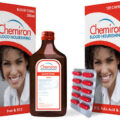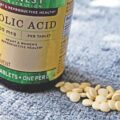The World Health Organization recommends daily iron and folic acid supplementation during pregnancy. Daily oral iron and folic acid supplementation with 30 mg to 60 mg of elemental iron and 400 µg (0.4 mg) folic acid is recommended for pregnant women to prevent maternal anaemia, puerperal sepsis, low birth weight, and preterm birth.
In most countries, a lack of iron stores before and during pregnancy leading to iron deficiency is the most common culprit of anemia. With this type of anemia, the lower iron stores lead to reduced production of hemoglobin (the oxygen-carrying component of the red blood cell).
During pregnancy, your body works harder to provide the right nourishment for your growing baby, causing blood volume to increase by about 45 percent. And that’s where that physiological anemia might come into play. Your body also provides your baby with the iron needed to make their own hemoglobin. Go, baby, go!
This increase in your blood volume and production of baby’s hemoglobin allows for more transportation of vital oxygen and nutrients, but it increases the daily requirement for essential minerals like iron.
Folate-deficiency anemia is another common kind of anemia that occurs during pregnancy. Folic acid is a water-soluble vitamin that helps prevent neural tube defects, or cognitive brain problems, during pregnancy. Women need higher levels of folate during their reproductive years and in pregnancy, which is why it’s often recommended to take a folic acid supplement even before trying to get pregnant.
Vitamin B12 is also used by the body in the production of red blood cells. Vitamin B12 is found primarily in fortified foods and animal products like meat, fish, poultry, and eggs. For this reason, women who don’t regularly consume these foods, including vegans and vegetarians, may be at a higher risk of deficiency. Some people may have also difficulty processing B12, which can lead to a deficiency as well.
Folate deficiency and vitamin B12 deficiency often occur together. If you think you may have a deficiency, your healthcare provider will need to look at lab values to determine what type of anemia you have.
Best Blood Tonic For Pregnancy
A blood tonic is a supplement that may be consumed as a means to produce more blood cells within the body. The exact recipe or constituents for such tonics may vary widely with each brand, but frequently contain iron, folic acid, B vitamins and a variety of vitamins plus other enrichments including amino acids.
There’s no set-in-stone formula for choosing blood tonic during pregnancy, but the majority of the options on the market contain these essentials:
- Folic acid (400-600 micrograms, mcg): Before you conceive, you’ll need 400 mcg of folic acid a day to prevent neural tube defects. During pregnancy, that amount should ideally increase to 600 mcg.
- Iron (27 milligrams, mg): Your body needs iron to make healthy red blood cells, which help shuttle oxygen throughout your body. Now that you’re pregnant, you’ll need to pump even more iron to meet the demands of your ever-expanding blood supply, which will in turn supply your baby with oxygen. If you don’t eat enough iron, you run the risk of developing pregnancy-induced anemia.
- Calcium (250 mg): Your growing baby needs calcium to build bones and teeth, but if you’re not a big milk drinker, you could be running low. Shoot for an intake of about 1,200 mg of calcium a day, including from food (you shouldn’t take more than 250 mg from a prenatal at the same time as supplementary iron).
- Vitamin D (400 IUs): When paired with calcium, vitamin D helps build baby’s bones and teeth.
- DHA: Although not all prenatals contain DHA (a fatty acid found in fish), it plays an important role in baby’s brain and eye development. Talk to your doctor to determine whether or not you are getting enough DHA from your diet.
- Vitamin B6 (2 mg): Vitamin B6 can help quell morning sickness during pregnancy.
- Iodine (150 mcg): Iodine helps your body produce thyroid hormones, which aids baby’s brain development. Problem is, mild iodine deficiency is common among pregnant women, which is why the American Academy of Pediatrics (AAP) recommends taking a prenatal that contains at least 150 mcg of iodine.
Always choose a supplement that contains no more than 4,000 IU (800 mcg) of vitamin A; higher doses (over 10,000 IUs) can be dangerous. It’s also a good idea to ask your doctor what they recommend when choosing a blood tonic or prenatal supplement.
Top Brands of Blood Tonic for Pregnancy In Nigeria
- Astyfer
- Bunto
- Chemiron
- Emzoron
- MIM
ALSO READ: Can I Take Blood Tonic During Menstruation?





